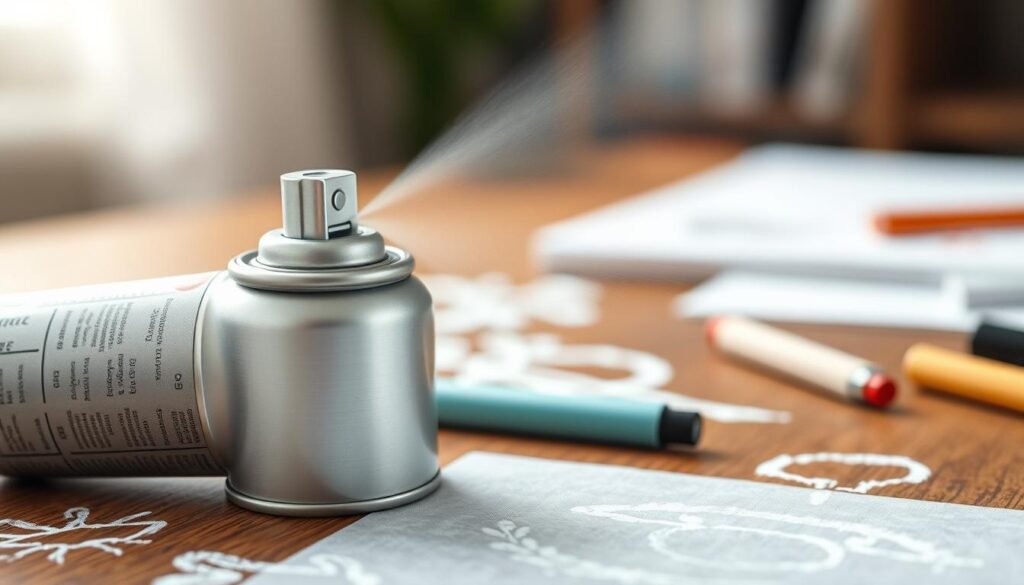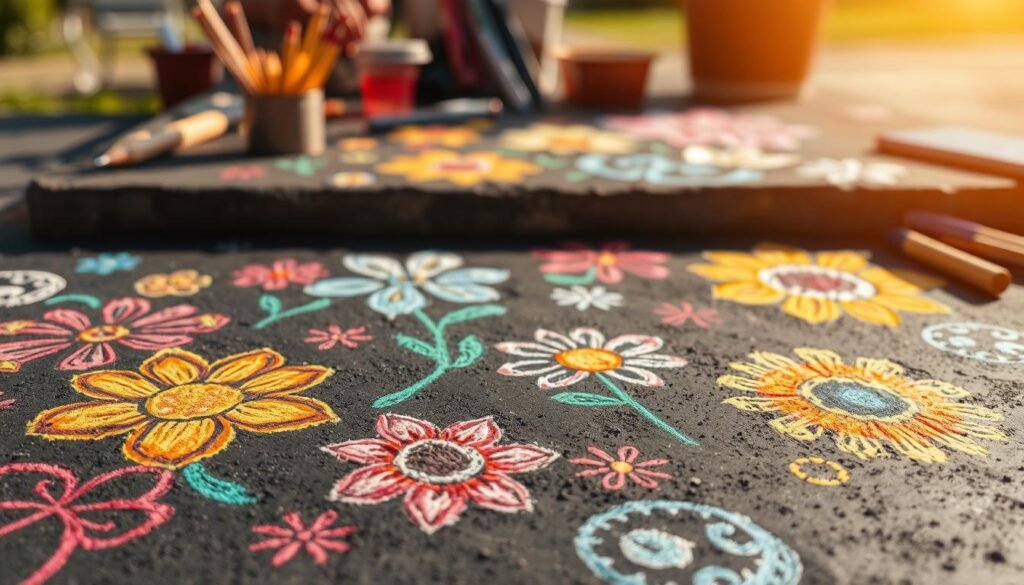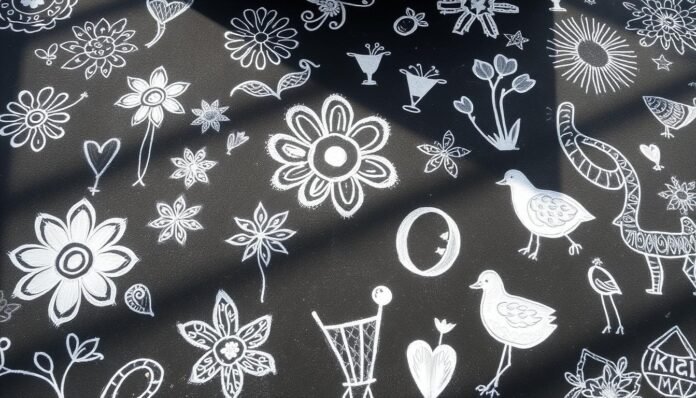Keeping white chalk artwork vibrant and detailed can be tricky. Fixatives help protect your chalk creations for long-lasting beauty. This guide shows you how to use fixatives on white chalk drawings step-by-step.
You’ll learn valuable tips and best practices along the way. These will help you preserve your artwork effectively. Whether you’re an artist, teacher, or hobbyist, this information is crucial.
Key Takeaways
- Understand the different types of fixatives available for white chalk art
- Learn the essentials of preparing your chalk artwork for fixative application
- Discover the proper techniques for applying a fixative to achieve the best results
- Explore alternative solutions like hairspray for temporary fixative needs
- Gain insights on preserving chalk art on various surfaces for long-lasting enjoyment
Understanding Fixatives for White Chalk Art
White chalk art needs the right fixative to preserve its delicate beauty. Fixatives protect artwork from smudging, fading, and environmental damage. They’re crucial tools for both professional artists and DIY enthusiasts.
Understanding different artist’s fixatives helps create stunning, long-lasting chalk drawings. These products offer various benefits for preserving your artistic creations.
Types of Fixatives Available
Fixative sprays come in many options for white chalk artists. Some are permanent, locking in your artwork. Others are temporary, allowing easy changes.
Different fixatives cater to various artistic needs and preferences. They offer flexibility in how you protect and preserve your work.
- Acrylic-based fixatives: These provide a durable, long-lasting seal for your chalk drawings, ensuring they withstand the test of time.
- Workable fixatives: Offering a more temporary solution, these fixatives allow you to continue working on your temporary art while providing a protective layer.
- Matte fixatives: For a subtle, non-glossy finish, matte fixatives are a popular choice for preserving the natural look of white chalk art.
Professional vs. DIY Solutions
Professional-grade artist’s fixatives offer superior quality and performance. However, DIY alternatives like hairspray can work for casual projects.
Consider the pros and cons of each option. This helps you choose the best fit for your needs and budget.
Benefits of Using Fixatives
The right fixative sprays offer many benefits for white chalk art. They protect against smudging and enhance longevity.
Using fixatives is crucial for preserving your artistic masterpieces. They help ensure your work stands the test of time.
| Benefit | Description |
|---|---|
| Smudge Protection | Fixatives create a clear, protective layer that prevents your chalk drawings from being accidentally smudged or rubbed off. |
| Increased Durability | By sealing the chalk medium, fixatives help your artwork withstand environmental factors like humidity, dust, and light exposure, extending its lifespan. |
| Versatility | Depending on the type of fixative, you can achieve different finishes, from matte to glossy, to suit your artistic vision. |
Essential Materials and Tools Needed for Applying a Fixative Over White Chalk
The right materials are crucial for applying fixative to white chalk art. This guide will help you choose the best tools to preserve your chalk creations.
Recommended Fixative Products
Professional-grade fixative sprays work best for white chalk. Choose products made for chalk or pastel media. Top options include:
- Krylon Preserve It! Fixative Spray
- Winsor & Newton Artists’ Fixative
- Sennelier Fixative Spray
These fixatives protect your art without changing its texture or look.
Application Tools and Protective Gear
You’ll need other supplies for a safe and smooth application. Here’s what to gather:
- Fixative spray applicator or atomizer
- Painter’s tape or masking tape (for protecting surrounding areas)
- Disposable gloves to avoid skin contact with the fixative
- Protective eyewear, such as safety goggles, to shield your eyes
- Well-ventilated work area or spray booth (for proper airflow)
These items help you apply fixative evenly and safely. They also protect your workspace and health.
Classroom Considerations
For chalk art in classrooms, you’ll need extra supplies. Make sure you have these items:
| Item | Quantity | Purpose |
|---|---|---|
| Disposable aprons or smocks | 1 per student | To protect clothing during the fixative application |
| Ventilation fans or open windows | 1 per workspace | To ensure proper airflow and ventilation |
| Chalk dust cleaning supplies | 1 per workspace | To clean up any excess chalk dust after fixative application |
Having these tools ready ensures a safe fixative application. This applies to both personal studios and classroom settings.
Preparing Your Chalk Artwork for Fixative Application
Proper preparation is key for preserving your chalk murals and sidewalk art. Follow these steps to keep your artwork vibrant and long-lasting. Your masterpiece deserves the best care possible.
Surface Cleaning Tips
Start by gently cleaning your chalk artwork’s surface. Use a soft-bristled brush or microfiber cloth to remove loose chalk dust. Don’t use water or cleaning solutions, as they may harm the chalk.
Environmental Considerations
Choose a well-ventilated area for applying fixative. Avoid direct sunlight and strong winds. These factors can affect drying time and the fixative’s effectiveness.
Testing in a Small Area
Test the fixative on a small, hidden area first. This helps you check its performance and drying time. You can also see how it affects the chalk’s look and texture.
These steps ensure your chalk murals and sidewalk art are ready for sealing. A high-quality fixative will protect your artwork for years to come.
Step-by-Step Guide to Applying a Fixative Over White Chalk
Preserving your white chalk artwork is crucial. A fixative can protect your masterpiece for years. This guide will show you how to apply it correctly.
Set up a well-ventilated workspace. Shield the area from drips or overspray. A fixative over white chalk needs careful handling.
- Start with a clean, dust-free surface. Gently wipe away any loose chalk particles with a soft, dry cloth.
- Hold the fixative spray can approximately 12-18 inches away from your chalk artwork. Maintain a steady, even distance as you spray.
- Apply the fixative in thin, even coats, moving the can in a side-to-side motion. Avoid heavy, dripping application, as this can compromise the integrity of your chalk work.
- Allow the first coat to dry completely, which typically takes 5-10 minutes. Then, repeat the process with a second, thin coat for maximum protection.
- Be patient and let the fixative fully dry, as indicated on the product’s instructions. Rushing this step can result in unwanted smearing or damage to your artwork.
Consistency and patience are key when applying fixative. Follow these steps carefully. Your chalk creation will stay beautiful for years.
Best Practices for Using Commercial Fixative Sprays
Commercial fixative sprays protect your white chalk artwork. They can help you achieve professional-quality results. Let’s explore key techniques, safety measures, and drying times.
Application Techniques
Proper application ensures even coating and protection. Here are some tips to keep in mind:
- Hold the fixative can 6-12 inches away from your artwork and apply in thin, even layers. Avoid heavy, concentrated spraying, as this can cause unwanted dripping or pooling.
- Use a sweeping motion, moving the can from side to side to cover the entire surface. Overlap each pass slightly to ensure complete coverage.
- Apply the fixative in multiple, light coats, allowing each layer to dry fully between applications. This helps build up a protective barrier without compromising the delicate chalk texture.
Safety Measures
Safety is crucial when working with artist’s fixatives and fixative sprays. Consider these precautions:
- Wear a properly fitted respirator mask to avoid inhaling the fixative fumes.
- Work in a well-ventilated area, preferably outdoors or in a studio with good airflow.
- Protect your eyes with safety goggles to prevent accidental splashing.
- Wear gloves to keep the fixative off your skin.
Drying Times
Drying times vary based on the specific fixative spray, environmental conditions, and application thickness. Here are some general guidelines:
- Allow each light coat to dry for 15-30 minutes before applying the next layer.
- After the final coat, let the artwork dry for at least 2-3 hours. Wait until the fixative feels fully cured and no longer tacky.
- Be patient and avoid handling the artwork until the fixative has had sufficient time to dry completely.
These best practices help protect your white chalk artwork. By following them, you’ll achieve a professional-grade finish. Your artwork will be preserved for years to come.
Alternative Solutions: Using Hairspray as a Temporary Fixative
Hairspray can be a budget-friendly option for preserving white chalk artwork. It serves as a temporary fixative for temporary art projects. However, it’s not as long-lasting as dedicated hairspray fixative products.
Hairspray is accessible and low-cost, making it convenient for quick touch-ups. Many households already have a can on hand. It’s crucial to understand its limitations and best uses.
Pros and Cons of Using Hairspray as a Fixative
- Pros:
- Readily available in most households
- Inexpensive compared to dedicated fixative products
- Can provide a temporary protective layer for chalk art
- Cons:
- Offers less protection and durability than professional fixatives
- May alter the appearance or texture of the chalk artwork
- May not be suitable for long-term preservation or outdoor display
Hairspray works well for quick fixes or temporary projects. However, it has limitations you should be aware of. For long-lasting or delicate chalk art, professional-grade hairspray fixative is recommended.
Professional fixatives ensure better protection and preservation of your temporary art. They’re ideal for artwork that needs to last longer or withstand outdoor conditions.

| Fixative Type | Durability | Application Ease | Cost |
|---|---|---|---|
| Hairspray | Low | High | Low |
| Professional Fixative | High | Moderate | Moderate |
Common Mistakes to Avoid When Applying Fixatives
Applying fixative preserves your white chalk drawings. However, it’s crucial to avoid common mistakes. Let’s explore these pitfalls and how to overcome them.
Overspraying Issues
Overspraying fixative is a frequent error. It can cause a cloudy appearance and damage the chalk medium. Follow the manufacturer’s instructions carefully.
Apply fixative in light, even coats. Allow each layer to dry completely before adding more. This approach ensures optimal protection without harming your artwork.
Temperature and Humidity Factors
Environmental conditions affect fixative application. Extreme temperatures can interfere with the fixative’s binding to chalk drawings. High humidity may cause uneven drying or slow setting.
Check the recommended application conditions for your specific fixative. Adjust your workspace as needed to create the ideal environment for application.
Being aware of these pitfalls helps protect your artwork. Take necessary precautions to keep your chalk drawings vibrant and long-lasting. Your efforts will ensure your art remains beautiful for years to come.
Preserving Chalk Art on Different Surfaces
Chalk art is engaging and versatile, but it’s fragile. Proper techniques are crucial to preserve your masterpieces. This applies to white chalkboards, sidewalk art, and chalk murals.
Protecting Chalk Art on White Chalkboards
White chalkboards offer a classic canvas for chalk art. The smooth surface can make it hard to keep creations intact. Applying a fixative spray is key to seal in the chalk.
Follow the manufacturer’s instructions carefully. Test the fixative on a small area before applying it to the entire piece.
Preserving Sidewalk Art
Sidewalk chalk art faces unique challenges. These include foot traffic and weather exposure. To protect your sidewalk masterpieces, use a clear acrylic sealant or varnish.
Choose a product designed for outdoor use. Apply the sealant in thin, even coats. Allow ample drying time between applications.
Maintaining Chalk Murals on Walls
Chalk murals on walls can produce stunning results. The porous surface can make it tricky to preserve the artwork. Apply a fixative spray to lock in the chalk pigments.
Be mindful of the wall’s material. Check for any potential reactions with the fixative before applying.
| Surface | Preservation Technique | Potential Challenges |
|---|---|---|
| White Chalkboards | Fixative Spray | Smooth surface, risk of smudging |
| Sidewalks | Acrylic Sealant or Varnish | Exposure to foot traffic and weather |
| Walls | Fixative Spray | Porous surface, potential reactions with fixative |
Understanding these challenges and using the right techniques is crucial. This ensures your white chalkboards, sidewalk art, and chalk murals continue to inspire. Your art can delight viewers for years to come.
Professional Tips for Long-Lasting Chalk Artwork
Preserving your chalk drawings requires care and attention. Artists work hard to create stunning pieces. Let’s explore tips to help your chalk drawings last for years.
Storage Recommendations
Proper storage safeguards your chalk drawings. Here are some expert recommendations to consider:
- Store your artwork in a cool, dry, and well-ventilated area, away from direct sunlight and humidity.
- Use artist’s fixatives or archival-quality storage boxes to protect your pieces from dust, moisture, and potential damage.
- Avoid folding or rolling your chalk drawings as this can lead to creases and irreversible damage.
- If possible, store your artwork flat and in a horizontal position to maintain its original shape and form.
Maintenance Guidelines
Regular maintenance keeps chalk drawings in pristine condition. Consider these guidelines:
- Gently dust your artwork using a soft, clean brush or a microfiber cloth to remove any accumulated particles.
- Avoid touching the surface of your chalk drawings with your bare hands, as the oils can deteriorate the medium over time.
- If your artwork requires cleaning, consult with a professional conservator to ensure the appropriate cleaning methods are used.
- Reapply artist’s fixatives periodically to preserve the vibrancy and protect your chalk drawings from environmental factors.
These tips will help keep your chalk drawings captivating. Proper storage and maintenance safeguard your art for years.

Troubleshooting Common Fixative Problems
Fixative application on white chalk art can be tricky. Issues like discoloration and uneven coverage may arise. Here are some tips to help you tackle these challenges.
Hazy or discolored finishes are a common problem. This happens when the fixative isn’t applied evenly. To avoid this, clean your artwork thoroughly before applying the fixative.
Follow the manufacturer’s instructions carefully when spraying. This will help ensure an even application and prevent discoloration.
Sometimes, the fixative doesn’t hold the chalk in place. This can cause flaking or smudging over time. Use a high-quality fixative made specifically for chalk art.
Allow enough drying time between applications. This will help the fixative set properly and keep your artwork intact.


